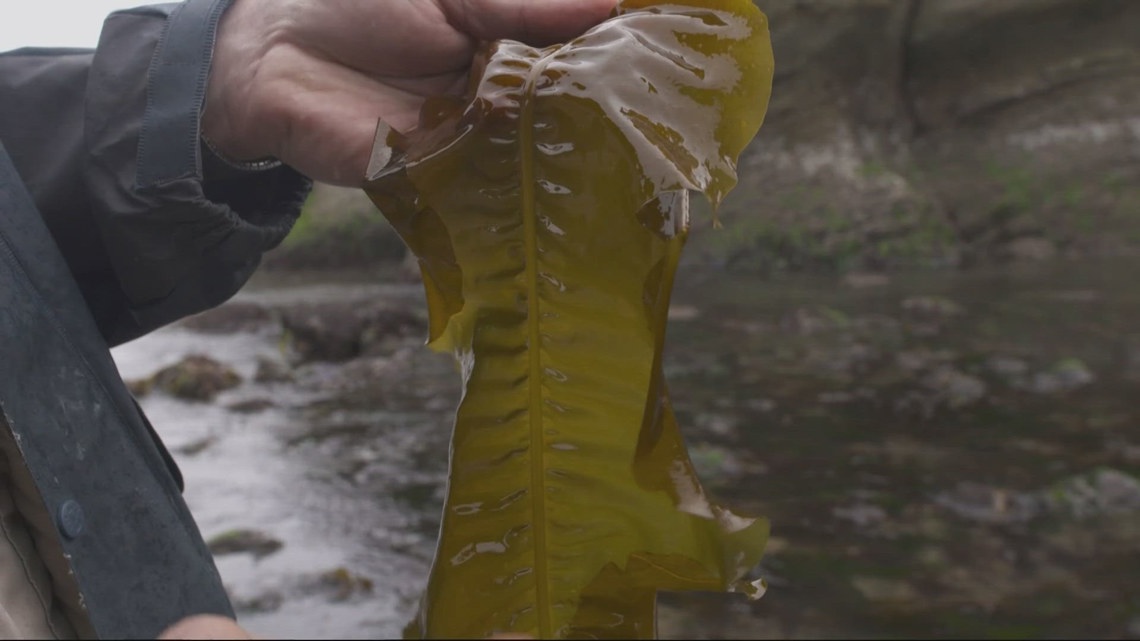Oregon's woods and beaches hide a wealth of wild edibles - KGW.com

John Kallas knows just where to find Oregon's tasty shellfish, seaweed and edible plants, making quick work of foraging for food.
TILLAMOOK, Ore. — This week, we head into nature's kitchen in the great outdoors as we join a group who have discovered that when the tide goes out, the dinner table is set.
John Kallas is a nutritionist, teacher and wild food forager who likes to say that when the tide goes out, his dinner table is set.
"Ah, this is the spot, but be careful because these rocks are slick," advised Kallas to his eager group of friends and students, all waiting to tap into his expertise across a low tide estuary in Tillamook County.
"Okay folks," Kallas continued. "All of the seaweed that we're going to collect can be eaten raw, there's no cooking involved. So, all these varieties that I show you this morning are fresh and perfectly good to eat."
Kallas said there are over 40 different seaweeds growing in the small corner of Tillamook Bay, such as angel wing kelp, nori and teriyaki seaweed.
Armed with scissors and plastic bags, each person quickly went to work harvesting the varied seaweeds. Kallas noted that each harvester is allowed to gather one gallon of seaweed per day.
Kallas first fell in love with exploring for wild edibles as a boy, and his passion has since blossomed into a lifetime of study, leading him to earn a PhD in nutrition.
He knows much about Oregon's wild edibles; not just seaweeds but all things edible, like butter clams.
At nearby Netarts Bay, we hiked across a broad sand flat that was exposed at low tide, providing easy access to the clam beds. There, we used clam shovels and dug for abundant butter clams.
Kallas' harvest method is simple enough: using the shovel, he dug down a couple of feet deep and went to work excavating, by hand, each side of the hole.
"Try to find a bunch of small clam holes on the sandy surface," he instructed. "Those are the clam necks poking through the sand (also called reveals) lined up in a row and then dig a trench next to them. You will find five or six clams from one trench."
Each clam digger must have an Oregon Shellfish License and dig only a daily limit of 20 butter clams.
Charla Ochse made the task look easy as she quickly dug and excavated clam after clam. "I got three clams just like that," she exclaimed with a hearty laugh. "You can get them real easy!"
That much is certain, for within an hour it was clam limits all around and it was time for our small group to make a move to a new location.
We traveled to the nearby Tillamook State Forest where springtime leafy edibles were easy to find, such as lemony Cascade sorrel, salmonberry blossoms and lady fern fiddle heads.
Kallas cautioned that knowing exactly what you harvest is critical to health and safety. When it comes to collecting and eating Oregon's wild edibles, he suggested taking a class or reading the right book, like his "Edible Wild Plants: Wild Foods From Dirt to Plate."
The text identifies most of the wild edibles you will find in Oregon and includes gorgeous colorful photos to show you what each plant looks like. There are also plentiful recipes that explain what to do with your abundance.
"The really wonderful thing is that until we've got everything together, we really won't know what we'll prepare," notes Kallas, "I like to say that 'the best is yet to come,' for the cooking and the eating are always fun ways to wrap up a day's adventure. The more that people realize that food doesn't just come from the supermarket they'll be more protective of their land too."
Be sure to watch the weekly half hour program of Grant's Getaways. The show airs each Saturday and Sunday at 4 p.m. on KGW.
You can also learn more about many of my favorite Oregon travels and adventures in the Grant's Getaways book series, including:
The book collection offers hundreds of outdoor activities across Oregon and promises to engage a kid of any age.
You can reach me: Gmcomie@kgw.com
Comments
Post a Comment